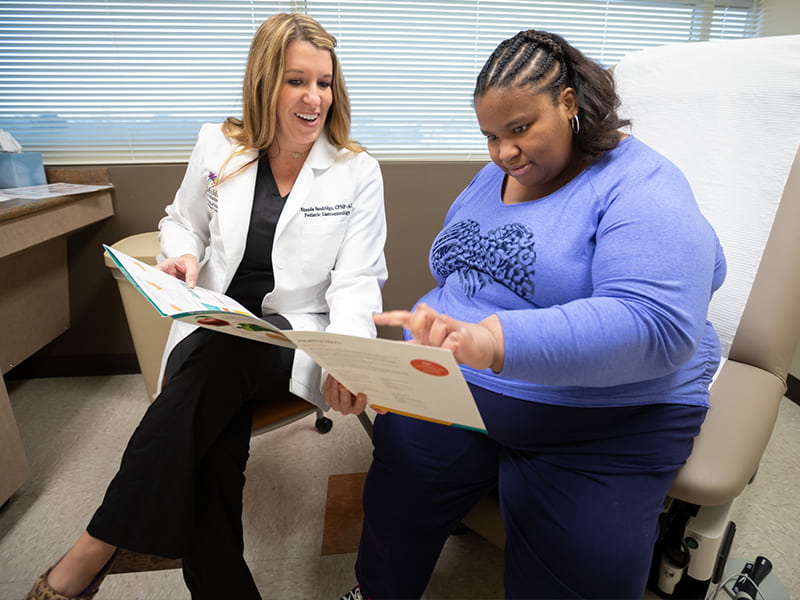Managing your weight: UMMC program offers individualized approach

When Katelyn Greenlaw eats, her body doesn’t get the memo when she’s had enough.
A rare genetic disease, Prader-Willi Syndrome, keeps Katelyn from experiencing the sensation of fullness. “In her mind, even after she eats, she will say she is hungry,” said Talisha Greenlaw, mom of 19-year-old Katelyn.
Children and adults with Prader-Willi often cope with obesity. “You eat and eat and eat. We have to be mindful of that,” Talisha Greenlaw said. Mild to moderate intellectual and developmental disabilities Katelyn copes with also are common with the syndrome.
Katelyn, however, is learning how to manage her food intake and nutrition decisions thanks to her multidisciplinary care team at the University of Mississippi Medical Center’s weight management program. The Madison Central High student is currently bridging from pediatric to adult care, said Shanda Sandridge, her pediatric gastroenterology nurse practitioner.
No matter the patient’s age, there’s a commonality in their care: Everyone has a specific team that works in tandem to create an individual treatment plan, especially in the face of pre-existing health conditions that can exacerbate obesity. And, care is structured so that patients can see multiple team members at a single appointment.

“I tell patients that this is a three-pronged approach: the exercise part, the nutrition part and the pharmacological part,” said Dr. Tobe Momah, an assistant professor in the Department of Family Medicine who is board-certified in obesity medicine.
“The more we treat them collaboratively, the better the outcome.”
The weight management program offers a number of options at its spacious new clinic location at Riverchase Medical Suites, 2550 Flowood Drive in Flowood.
Adult medical, non-surgical weight management is led by Momah and Dr. Kimberly Bibb, also an assistant professor in the Department of Family Medicine and board-certified in obesity medicine.
The care team also includes registered dietitian Paul Robertson and Dr. Buren Smith, a clinical psychologist. The program also includes pharmacy services, meal replacement and supplements, and lifestyle and behavior therapy. Exercise therapy is provided at UMMC’s Wellness Center in Flowood.
Americans with a body mass index of 40 or greater are considered morbidly obese. Patients seen by Momah and Bibb, most between ages 40-50, have an average BMI of 50.3. A healthy weight for adults generally equates to a BMI of at least 19 but less than 25.
“That tells you how severe the problem is in Mississippi,” Momah said. The state consistently ranks either first or second nationally in rates of obesity at about 39 percent of residents.
Adult bariatric surgery is led by Dr. Kenneth Vick, professor of general surgery. The care team includes Robertson, Smith, nurse practitioner Jennifer Godbold, and the nursing and support staff.
Candidates for bariatric surgery generally have a body mass index of at least 40, or 35 with co-morbidities such as cardiovascular disease or diabetes, said Adam Dungey, the Medical Center’s administrator of weight management services. Procedures offered include vertical sleeve gastrectomy, Roux-en-Y gastric bypass and adjustable gastric band in addition to revisional bariatric procedures.
Patients must complete an extensive screening process to receive medical clearance, which can include a sleep study, cardiovascular screens, a psychological evaluation and pre-surgery education, Dungey said. A surgical workup follows, and they receive comprehensive post-operative follow-up care for life.
Sandridge leads pediatric weight management, with collaborating providers including the entire adult weight management team and Dr. Naznin Dixit, professor of pediatric endocrinology.
The team also includes dietitian Krista King and Dr. Crystal Lim, a psychologist and a director in the Department of Psychiatry and Human Behavior. Patients receive lifestyle and behavior therapy, family education and meal supplementation.

“The great thing about it all is that patients are medically supervised,” Dungey said.
The weight management program is recognized as a Quality Comprehensive Center under the American College of Surgeons’ Metabolic and Bariatric Surgery Accreditation and Quality Improvement Program.
Patients often come to the program “as their very last straw,” Momah said. “Most come because they want to lose weight to have a procedure – a transplant, or knee or hip surgery. They might say their doctor won’t operate on them because they want them to lose weight first.”
Some patients immediately want bariatric surgery, even though they haven’t tried and failed to lose weight through diet and exercise. “We want them first to try to lose weight in a non-surgical manner. We don’t want surgery to be seen as the easy way out, because it’s not,” Dungey said.
The weight management team first educates patients about nutrition and lifestyle changes they must make in order to reach and maintain their goal weight. “Some patients lose weight that way and don’t need surgery,” he said.
But for others, surgery is a tool to get them started because it decreases the size of the stomach, thus the amount of food you can take in, Dungey said.
Ongoing care from the entire team is critical to patients maintaining their weight loss, he said. “That and lifestyle changes are the most important factors,” he said. “If you don’t make the other changes, you won’t have success.”
When a pediatric patient still requires care as they approach adulthood, they’re transitioned to the adult team. And for some children, the weight loss journey can begin when they’re as young as 2, Sandridge said. “The most common ages we see are 8 to 12, but we do see a fair number of toddlers who are overweight and who already have comorbidities,” she said.
Children undergo many of the same front-end screening as adults, including checks for depression, anxiety and bullying. Often, the entire family, not just the child, needs help with motivation for weight management, Sandridge said.
“The family has to be on board,” she said. “Children mirror what they see others do, so we try to make it a family-based approach so that everyone is practicing a healthy lifestyle. That way, one child isn’t being singled out.”
Exercise can be as simple as “just putting on music and dancing is a way to be active, and there are online videos,” Sandridge said. ‘We figure out what the child is interested in.”
Katelyn is learning to be mindful of everything she eats, including her carbohydrate intake, Greenlaw said. The program suggests 30 carbs per meal and 15 per snack, but Greenlaw sometimes cuts those numbers to give Katelyn a little leeway in the event she unexpectedly takes in an extra snack. “That way, it won’t tip the scales,” Greenlaw said.
“If someone gives her the option between an apple and a cookie, she will pick the apple, even though she wants the cookie. I let it be her decision.”
Sandridge has been a big help, Greenlaw said. “She suggested getting Katelyn her own small refrigerator. All of the things in it are hers. We also pack lunch in cute containers, and if we do a turkey burger, she uses lettuce for the bread.”
The multidisciplinary approach to care is good for communication and convenience, Greenlaw said. “She has several doctors already, so it makes it a lot easier to see them all at one time,” she said. “Katelyn likes it because each of them knows her progress, and she has three people giving her praise as opposed to just one person.
“When we leave, she wants to be able to lose five more pounds. She says, ‘Crystal will be proud of me. Shanda will be proud of me.’”
The weight management program “is a much-needed service,” Momah said. “We know as clinicians that once we get a patient’s weight under control, then it helps us control heart disease, diabetes, high blood pressure, arthritis, stroke and kidney disease.
“The bottom line is that weight management is comprehensive and collaborative care in all aspects.”
To find a weight management program that works for you, call 601-984-1285 or email weightmanagement@umc.edu

